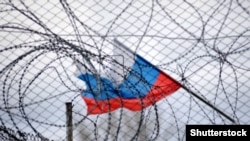When the European Commission started briefing EU states last month on the next sanctions package expected to be imposed on Russia, the 27 member nations expected concrete written proposals to follow. They're still waiting.
Normally these sorts of documents -- in this case the potential 18th round of restrictive measures since the Kremlin’s full-scale invasion of Ukraine was launched more three years ago -- are provided only a few days after the briefings, or “confessionals” as they are known in Brussels.
The documents outline details of what the commission is considering about targeting. In turn, EU members provide red lines as to what they are willing to agree on since all sanctions require unanimity.
So what's the holdup? Two things.
The first is that some EU member states -- including larger ones such as Germany and France -- wanted to wait and see how June 2 peace talks in Istanbul between Russia and Ukraine proceeded.
Several EU officials told RFE/RL on the condition of anonymity that they don't believe Moscow is serious about making progress in negotiations with Kyiv and wanted to wait and see the results.
Aside from agreeing to swap thousands of their dead and seriously wounded troops, the two sides made no progress toward ending Europe's longest and deadliest conflict since World War II.
Then there is the United States.
So far, President Donald Trump has refrained from targeting Moscow with sanctions even though he has threatened to do so on numerous occasions.
The reason given is the same as the Europeans: he wants to give the Russia-Ukraine negotiations every chance possible to succeed. And Brussels is desperate to have Washington onboard on for any new sanctions.
European diplomats say they are relieved that the US hasn’t, at least so far, accepted “a rushed, bad peace deal,” or that the Americans simply haven't walked away from the issue despite threatening to.
And while they admit that sanctions are no longer synchronized like they were during the Biden administration, they are still keen to coordinate any coming round of measures to maximize their impact and message.
Sanctions from Washington may also help coax some EU countries such as Hungary -- run by Trump ally Viktor Orban -- to go along with another wave of measures despite voicing concerns over their effectiveness.
So, what would the 18th package contain?
EU diplomats familiar with the file note that one particular item would require American consent: lowering the G7 Russian oil price cap to $45.
The cap has held at $60 for years even though oil prices have traded below that level.
The idea is that the leaders formally will agree to decrease the price cap to at least $50 when they meet at the G7 Summit in Canada on June 15-17.
The group’s finance ministers couldn’t reach an agreement in May as Washington resisted the move. Some EU officials told RFE/RL that they believe there could be movement on the issue soon.
Much like the EU’s 17th package that was adopted on May 20, the new measures include blacklisting more individuals and targeting the Russian shadow fleet.
On the latter, the EU has targeted more than 300 vessels that the bloc believes Moscow uses to circumvent sanctions, notably the export of oil.
With an additional 600 boats believed to be part of the fleet, the goal of the upcoming measures is to add as many as those as possible even if European diplomats admit it is a challenge to find evidence that stands up in court proving that the Kremlin is financing the ships.
More visa bans and asset freezes are also expected, with the EU looking to add another 100 individuals and companies to a sprawling list of those sanctioned that exceeds 2,400 entries.
The European Commission also could propose reintroducing those previously removed from the blacklist.
Another move could be to hit Russian diplomats who have been posted in various European countries and are suspected of spying on behalf of Moscow.
The proposal also includes sanctions on the Nordstream pipelines connecting Russia with Germany.
No gas is flowing through them at the moment, but Berlin has indicated that it wants formal measures to apply as some talks have resurfaced in the country about using them again in case relations with Moscow improve.
There is also an idea to cut more than 20 Russian banks from the SWIFT international payments system, even though most of the country’s big banks already have been targeted.
The Russian foreign direct investment fund could also be hit, and the bloc is planning to introduce trade restrictions that would prevent European companies from exporting various industrial components that Russia may use to fuel its war machine.
In the meantime, EU members will have to wait for the commission to write down its proposals.












